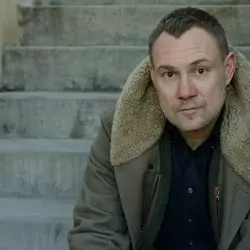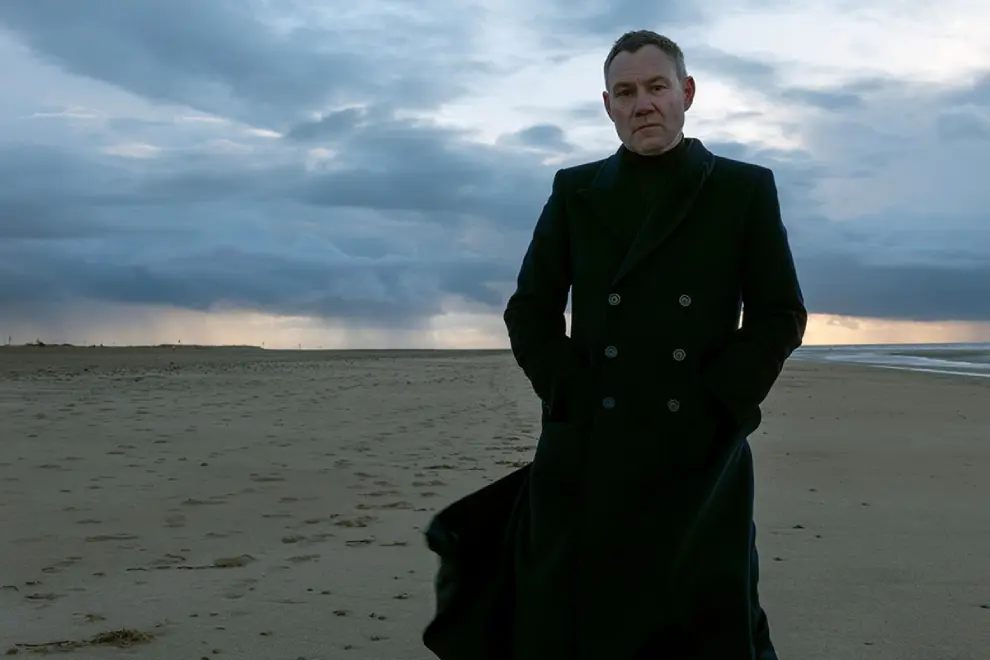 David Gray
David GrayDavid Gray is telling a story from his most recent tour of America. As an individual born with a motor mouth and a proclivity to yap, actively listening does not come easily to this scribe. But here, it’s different. It goes without saying that when David Gray opens his mouth, you listen.
“It was on a night during my American tour,” he begins, his voice steady as it floats through the Zoom call, “when the weather turned, and we couldn’t get the bus over the Rocky Mountains. It was chaos, really—so my team had to head back to New Mexico.”
Gray’s words paint a vivid image. I imagine him and his team huddling together in a catering room, trying to figure out their next step. "But I wasn’t going to let that stop me. So, I took two guitars, flew with my techs, and did the show anyway. That’s the thing, I’m lucky. It’s just me and the music."
That simple moment encapsulates the essence of David Gray. In an age where artists often rely on multifarious pyrotechnics and LED screens to draw a crowd, Gray’s offerings are much simpler: a man and his instruments.
And this, of course, has always been his way.
Don't miss a beat with our FREE daily newsletter
David Gray’s rise began long before the fame and sold-out arenas. In the early ‘90s, like countless other hopefuls, he wandered the streets of London, moving from pub to pub, chasing whatever gig came his way. His early albums went largely unnoticed, whispers in a crowded room, fading in the noise of the music industry.
It wasn’t until White Ladder was released in 1998 that something shifted. Born of quiet nights in a modest bedroom in Stoke Newington—where the world outside felt distant and irrelevant—the album would change everything.
“There was something about it,” Gray muses, nostalgia lining his voice. “It had this magic. We played the first show in Sligo, Ireland, and it was like everyone understood something we hadn’t even put into words yet. It pushed itself into the world. It just… went. I still don’t fully know what happened with that album. It’s like it found its own path.”
Indeed, White Ladder became a cultural force during the early noughties. It didn’t just fill the soundtracks of romantic comedies; it became a part of the cultural fabric, later becoming the twenty-eighth best-selling album in the UK of all time. Hits like This Year’s Love, Babylon, Sail Away, and Please Forgive Me were played endlessly, especially at dinner parties.
Gray has watched its resonance endure. "I see my daughter’s friends discovering my music, and sometimes I’ll look out into the crowd and see whole families—granny, daughter, granddaughter—standing together, singing along. It’s strange, seeing it passed down like that."
There’s a certain magic in those moments, the passing of time reflected in the familiar chords of his songs. Time, with all its inevitable changes, has shaped not only his music but the way we experience it.
Now, Gray finds himself in a new chapter.
He’s left behind the quiet, leafy streets of Hampstead for the heart of London’s bustling W1. The move is still fresh, and there’s uncertainty in his voice when he speaks about it. "We sold the house in Hampstead," he explains. "We moved into the city. I’m still getting used to it. I like it—there’s life here, shops, galleries. But it’s a bit of a transition. We’re not sure yet if we’ll settle here or return to somewhere quieter."
For all the success he’s had, Gray has never truly settled. His career, much like his life, has been marked by a rhythm of constant motion, a quiet search for something just beyond the horizon.
In November, Gray will return to Australia for the Past and Present tour—a title that feels almost ironic, given the expanse of his career. “We came on the White Ladder tour right after COVID had hit,” he recalls. “There was something in the air during those shows. The world had changed, and people needed that record. But we don’t take any of it for granted anymore. We understand its value more now.”
Gray’s reflection on the pandemic feels like the quiet rumbling of a larger truth. It was a moment of pause, a time when the music industry began to reassess its future. When I ask him about the state of the industry today, he sighs. “It’s busy again, but nothing’s really changed. Touring is still a massive strain on the environment, but nobody’s doing enough to address it. There are no real changes in how things are run.”
He’s right. The environmental costs of touring have been widely discussed, yet Gray points out that the true impact lies in the audience. “It’s not just the artists,” he says. “It’s the people coming to the shows—the travel, the carbon footprint. It’s a massive, often overlooked issue.”
But Gray isn’t one to shy away from difficult realities. For all the challenges, he knows the music industry itself is fragile. “The streaming economy doesn’t work for anyone,” he admits. “If you’ve got a big back catalogue, you get these tiny payments—just enough to cover costs. It’s like trying to make something out of nothing.”
The industry, he believes, has shifted fundamentally, and if he were starting out today, it would be a different journey. “If I were beginning now, I don’t think I’d make it. Not in the same way. There’s no room for failure. You’re expected to hit it big from the start. That was never the case for me.”
He thinks of other artists, like David Bowie, who, in today’s cutthroat industry, might never have been given the chance to fail and grow. Nile Rodgers once remarked that Bowie, had he been starting out today, wouldn’t have had the same opportunity. “They gave him time to make a hit,” Rodgers said. “Labels believed in him, took on the financial responsibility, and carried him. Those days are gone.”
Gray nods thoughtfully. “I would never have been given the same space to develop if I was starting now. The industry doesn’t work like that anymore. You’ve got to sell yourself from day one. I was just one man with a guitar, so I was cheap. I had room to fail and grow into what I am now.”
Despite the challenges, Gray remains hopeful. “There’s always a way,” he says with quiet confidence. “The internet offers a new route. Artists have access to their audience in a way they never could before. It’s a different game now, but it’s still a game worth playing.”
Now, more than three decades into his career, Gray has nothing left to prove. Thirteen albums later, he’s still driven by the need to create. His latest album, Dear Life, released in January 2025, is his latest challenge. “This record is just as urgent as anything I’ve done,” he says. “Just because we’ve lived a little longer doesn’t mean the fire’s gone out. In some ways, it burns even brighter.”
There’s something unshakable about Gray’s drive, a quiet yet relentless force that refuses to be extinguished. “Time is finite,” he admits. “But while we can, we’ll keep pushing. We’re not done yet.”
Gray pauses, reflecting on his place in the world of music. When he speaks again, his voice is filled with conviction. “Music isn’t just an escape,” he says firmly. “It’s grounding. It’s truth. It’s a battery, a positive charge that brings you back to a place where you can rebuild. Fuck politics, it’s a shambles: a terrifying shamble. It’s an idiot game show where real people get hurt.”
“But music,” he says with finality, “that’s where we can build something real.”
David Gray will be bringing his ‘Past & Present World Tour’ to Australia in November. He will be touring Perth, Adelaide, Melbourne, Sydney and Brisbane. Tickets can be purchased via the Frontier Touring website.
Presented by Frontier Touring
DAVID GRAY
+ special guest GORDI
AUSTRALIAN TOUR - NOVEMBER 2025
ALL SHOWS LICENSED ALL AGES
Tuesday 4 November - Riverside Theatre, PCEC | Perth, WA
Wednesday 5 November - Riverside Theatre, PCEC | Perth, WA | NEW SHOW
Friday 7 November - Thebarton Theatre | Adelaide, SA | SOLD OUT
Sunday 9 November - Palais Theatre | Melbourne, VIC | SOLD OUT
Monday 10 November - Palais Theatre | Melbourne, VIC
Wednesday 12 November - State Theatre | Sydney, NSW | SOLD OUT
Thursday 13 November - State Theatre | Sydney, NSW | SOLD OUT
Saturday 15 November - Queensland Performing Arts Centre (QPAC) Concert Hall | Brisbane, QLD | SOLD OUT
Sunday 16 November - Queensland Performing Arts Centre (QPAC) Concert Hall | Brisbane, QLD | SOLD OUT
Sunday 16 November [EVENING] - Queensland Performing Arts Centre (QPAC) Concert Hall | Brisbane, QLD | SOLD OUT
















